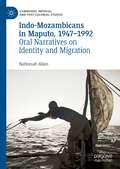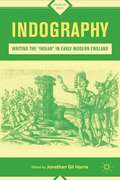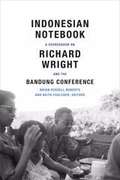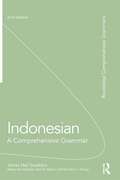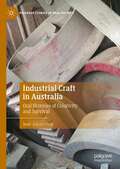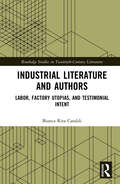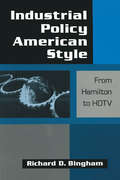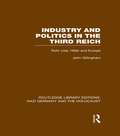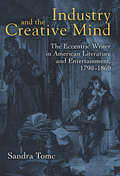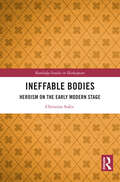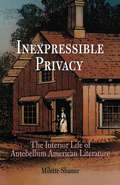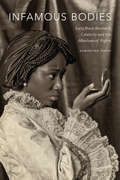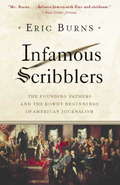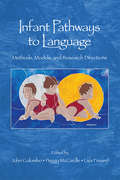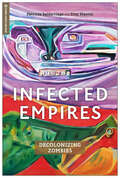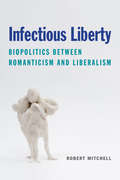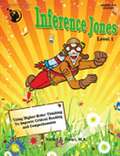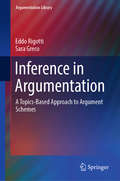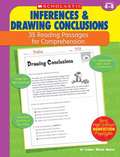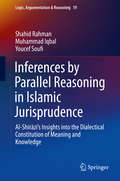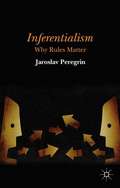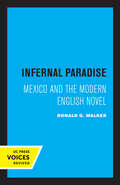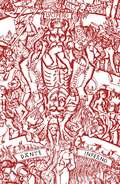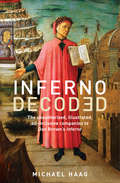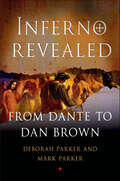- Table View
- List View
Indo-Mozambicans in Maputo, 1947-1992: Oral Narratives on Identity and Migration (Cambridge Imperial and Post-Colonial Studies)
by Nafeesah AllenThis book explores the experiences of ‘Indo-Mozambicans,’ citizens and residents of Mozambique who can trace their origins to the Indian subcontinent, a region affected by competing colonialisms during the twentieth century. Drawing from ethnographic interviews, the author illustrates why migration developed as both an identity marker and a survival tool for Indo-Mozambicans living in Maputo, in response to the series of independence movements and prolonged period of geo-political uncertainty that extended from 1947 to 1992. A unique examination of post-colonialism, the book argues that four pivotal moments in history forced migratory patterns and ethnic identity formations to emerge among Indo-Mozambicans, namely, the end of the British empire in India and the subsequent partition of India and Pakistan in 1947; the end of the Portuguese empire in India, with the annexation of Goa, Daman and Diu in 1961; the independence of Mozambique from Portugal in 1975; and the civil war of Mozambique from 1977 to 1992. Framing these historical markers as trigger points for shifts in migration and identity formation, this book demonstrates the layered experiences of people subject to Portuguese colonialism and highlights the important perspective of those ‘left behind’ in migration studies.
Indography
by Jonathan Gil HarrisIn the fifteenth and sixteenth centuries, Europeans invented 'Indians' and populated the world with them. The global history of the term 'Indian' remains largely unwritten and this volume, taking its cue from Shakespeare, asks us to consider the proximities and distances between various early modern discourses of the Indian. Through new analysis of English travel writing, medical treatises, literature, and drama, contributors seek not just to recover unexpected counter-histories but to put pressure on the ways in which we understand race, foreign bodies, and identity in a globalizing age that has still not shed deeply ingrained imperialist habits of marking difference.
Indonesian Notebook: A Sourcebook on Richard Wright and the Bandung Conference
by Brian Russell Roberts Keith FoulcherWhile Richard Wright's account of the 1955 Bandung Conference in The Color Curtain has been key to shaping Afro-Asian historical narratives, Indonesian accounts of Wright and his conference attendance have been largely overlooked. Indonesian Notebook contains myriad documents by Indonesian writers, intellectuals, and reporters, as well as a newly recovered lecture by Wright, previously published only in Indonesian. Brian Russell Roberts and Keith Foulcher introduce and contextualize these documents with extensive background information and analysis, showcasing the heterogeneity of postcolonial modernity and underscoring the need to consider non-English language perspectives in transnational cultural exchanges. This collection of primary sources and scholarly histories is a crucial companion volume to Wright'sThe Color Curtain.
Indonesian: A Comprehensive Grammar (Routledge Comprehensive Grammars)
by James Neil Sneddon K Alexander Adelaar Dwi N. Djenar Michael EwingThis grammar is a complete reference guide to the language of Indonesia as used by native speakers. The book is organised to promote a thorough understanding of Indonesian grammar. It presents the complexities of Indonesian in a concise and readable form. An extensive index, cross-referencing and a generous use of headings will provide readers with immediate access to the information they require. Key features: to aid clarity, all word groups and structures discussed are illustrated by natural examples of frequently used words and expressions each section can be read independently, enabling the reader to focus on a specific aspect of the language, if required all major structures of Indonesian, from words to complex sentences are described in detail common grammatical terms used are all clearly defined in an extensive glossary. By providing a comprehensive description of Indonesian in a clear and non-technical manner, this grammar makes an ideal reference source for all users of the language, whether in colleges, universities or adult education classes of all types. James Neil Sneddon was Associate Professor in the Faculty of Asian and International Studies at Griffith University, with long experience teaching Indonesian language and linguistics. He is also author of Understanding Indonesian Grammar. Alexander Adelaar is Principal Fellow in the Asia Institute at the University of Melbourne. He is author of a number of books on Austronesian linguistics. Dwi Noverini Djenar lectures in the Department of Indonesian Studies at the University of Sydney. She is author of Semantic, Pragmatic and Discourse Perspectives of Preposition Use: A study of Indonesian locatives. Michael C Ewing is a senior lecturer in Indonesian Studies at the Asia Institute at the University of Melbourne. He is author of Grammar and Inference in Conversation: Identifying clause structure in spoken Javanese.
Industrial Craft in Australia: Oral Histories of Creativity and Survival (Palgrave Studies in Oral History)
by Jesse Adams SteinThis book is the first of its kind to investigate the ongoing significance of industrial craft in deindustrialising places such as Australia. Providing an alternative to the nostalgic trope of the redundant factory ‘craftsman’, this book introduces the intriguing and little-known trade of engineering patternmaking, where objects are brought to life through the handmade ‘originals’ required for mass production.Drawing on oral histories collected by the author, this book highlights the experiences of industrial craftspeople in Australian manufacturing, as they navigate precarious employment, retraining, gendered career pathways, creative expression and technological change. The book argues that digital fabrication technologies may modify or transform industrial craft, but should not obliterate it. Industrial craft is about more than the rudimentary production of everyday objects: it is about human creativity, material knowledge and meaningful work, and it will be key to human survival in the troubled times ahead.
Industrial Literature and Authors: Labor, Factory Utopias, and Testimonial Intent (Routledge Studies in Twentieth-Century Literature)
by Bianca Rita CataldiIn recent years, the field of literary studies at the international level has become more involved in the analysis of the so-called industrial literature, a literary genre that focuses on the literary representation of factory work and workers’ alienation. This book engages in the ongoing debate by offering a narratological analysis of Italian industrial novels in particular, while taking into consideration their paratexts and interrogating the possibility of the presence of a testimonial intent in the text. The study reconstructs the connections between visions of factory utopias and Italian industrial literature, starting with an overview of said visions of utopia and how they came into being in Europe following the industrial revolution. It then proceeds by exploring the relationship between the twentieth-century Italian entrepreneur Adriano Olivetti and Italian industrial authors, and the influence that Olivetti’s visions of factory utopia had on these writers and how they perceived themselves as witnesses of factory life and workers’ alienation. In analyzing these texts, and particularly the novels by Paolo Volponi and Ottiero Ottieri, the book focuses on the previously overlooked representation of the self in industrial literature and on how this self expresses the need for testimony.
Industrial Policy American-style: From Hamilton to HDTV
by Richard D. BinghamThe proper role of government in the US economy has long been the subject of ideological dispute. This study of industrial policy as practised by administration after administration, explores the variations from a hands-off approach to protectionist policies and aggressive support for businesses.
Industry and Politics in the Third Reich: Ruhr Coal, Hitler and Europe (Routledge Library Editions: Nazi Germany and the Holocaust)
by John GillinghamWhen originally published in 1985 this was the first detailed study of business in Nazi Germany. Drawing on a wealth of new evidence from government and private archives, the book throws light on the important role played by Germany heavy industry in preserving traditions valuable for the post-Nazi future. Contrary to widely held beliefs, the industrialists of the Ruhr did not master-mind the economic strategy of the third Reich, nor were they the helpless victims of Hitler’s tyranny. In this penetrating study, the author reveals that while the management of the coal industry in the Ruhr certainly cooperated with Hitler, they did so only to the extent that it served their own purposes, which were far less destructive than those of the regime.
Industry and the Creative Mind: The Eccentric Writer in American Literature and Entertainment, 1790-1860
by Sandra TomcIndustry and the Creative Mind takes a radically new look at the figure of the eccentric, alienated writer in American literature and entertainment from 1790 to 1860. Traditional scholarship takes for granted that the eccentric writer, modeled by such Romantic beings as Lord Byron and brought to life for American audiences by the gloomy person of Edgar Allan Poe, was a figure of rebellion against the excesses of modern commercial culture and industrial life. By contrast,Industry and the Creative Mind argues that in the United States myths of writerly moodiness, alienation, and irresponsibility predated the development of a commercial arts and entertainment industry and instead of forming a site of rebellion from this industry formed a bedrock for its development. Looking at the careers of a number of early American writers---Joseph Dennie, Nathaniel Parker Willis, Edgar Allan Poe, Fanny Fern, as well as a host of now forgotten souls who peopled the twilight worlds of hack fiction and industrial literature---this book traces the way in which early nineteenth-century American arts and entertainment systems incorporated writerly eccentricity in their "logical" economic workings, placing the mad, rebellious writer at the center of the industry's productivity and success.
Ineffable Bodies: Heroism on the Early Modern Stage (Routledge Studies in Shakespeare)
by Christine SukicIneffable Bodies focuses on early modern heroism in drama through the notion of ineffability in order to define new dramatic forms. Drawing from Vladimir Jankélévitch’s studies on the ineffable, the book focuses on heroic bodies on the early modern stage as the seat of an aesthetic shift in drama: the early modern heroic body testifies to an inability to tell heroic stories. Examples are taken from plays by Shakespeare, Chapman and Daniel in which martial heroes are placed in a position where they cannot give full sway to their heroic status or are simply revealed as failed heroes. The playwrights experiment with action and favour forms that have lost their meaning or contents, stressing the mutation from the factual or the material to the immaterial and the ineffable.
Inexpressible Privacy
by Milette ShamirSelected by Choice magazine as an Outstanding Academic Title for 2006Few concepts are more widely discussed or more passionately invoked in American public culture than that of privacy. What these discussions have lacked, however, is a historically informed sense of privacy's genealogy in U.S. culture. Now, Milette Shamir traces this peculiarly American obsession back to the middle decades of the nineteenth century, when our modern understanding of privacy took hold.Shamir explores how various discourses, as well as changes in the built environment, worked in tandem to seal, regulate, and sanctify private spaces, both domestic and subjective. She offers revelatory readings of texts by Nathaniel Hawthorne, Frederick Douglass, Herman Melville, Harriet Beecher Stowe, Henry David Thoreau, and other, less familiar antebellum writers and looks to a wide array of sources, including architectural blueprints for private homes, legal cases in which a "right to privacy" supplements and exceeds property rights, examples of political rhetoric vaunting the sacred inviolability of personal privacy, and conduct manuals prescribing new codes of behavior to protect against intrusion.
Infamous Bodies: Early Black Women’s Celebrity and the Afterlives of Rights
by Samantha PintoThe countless retellings and reimaginings of the private and public lives of Phillis Wheatley, Sally Hemings, Sarah Baartman, Mary Seacole, and Sarah Forbes Bonetta have transformed them into difficult cultural and black feminist icons. In Infamous Bodies, Samantha Pinto explores how histories of these black women and their ongoing fame generate new ways of imagining black feminist futures. Drawing on a variety of media, cultural, legal, and critical sources, Pinto shows how the narratives surrounding these eighteenth- and nineteenth-century celebrities shape key political concepts such as freedom, consent, contract, citizenship, and sovereignty. Whether analyzing Wheatley's fame in relation to conceptions of race and freedom, notions of consent in Hemings's relationship with Thomas Jefferson, or Baartman's ability to enter into legal contracts, Pinto reveals the centrality of race, gender, and sexuality in the formation of political rights. In so doing, she contends that feminist theories of black women's vulnerable embodiment can be the starting point for future progressive political projects.
Infamous Scribblers: The Founding Fathers and the Rowdy Beginnings of American Journalism
by Eric BurnsInfamous Scribblers is a perceptive and witty exploration of the most volatile period in the history of the American press. News correspondent and renonwned media historian Eric Burns tells of Ben Franklin, Alexander Hamilton and Sam Adams-the leading journalists among the Founding Fathers; of George Washington and John Adams, the leading disdainers of journalists; and Thomas Jefferson, the leading manipulator of journalists. These men and the writers who abused and praised them in print (there was, at the time, no job description of "journalist") included the incendiary James Franklin, Ben's brother and one of the first muckrakers; the high minded Thomas Paine; the hatchet man James Callender, and a rebellious crowd of propagandists, pamphleteers, and publishers. It was Washington who gave this book its title. He once wrote of his dismay at being "buffited in the public prints by a set of infamous scribblers. " The journalism of the era was often partisan, fabricated, overheated, scandalous, sensationalistic and sometimes stirring, brilliant, and indispensable. Despite its flaws-even because of some of them-the participants hashed out publicly the issues that would lead America to declare its independence and, after the war, to determine what sort of nation it would be.
Infant Pathways to Language: Methods, Models, and Research Directions
by John Colombo Peggy McCardle Lisa FreundThe recent progress in cognitive neuroscience, and the importance of genetic factors and gene-environment interactions in shaping behavioral functions in early childhood, have both underscored the primacy of early experience and development on brain development and function.The contributors to this volume discuss different paradigms and approaches
Infected Empires: Decolonizing Zombies (Global Media and Race)
by Patricia Saldarriaga Emy ManiniGiven the current moment--polarized populations, increasing climate fears, and decline of supranational institutions in favor of a rising tide of nationalisms-- it is easy to understand the proliferation of apocalyptic and dystopian elements in popular culture. Infected Empires examines one of the most popular figures in contemporary apocalyptic film: the zombie. This harbinger of apocalypse reveals bloody truths about the human condition, the wounds of history, and methods of contending with them. Infected Empires considers parallels in the zombie genre to historical and current events on different political, theological and philosophical levels, and proposes that the zombie can be read as a figure of decolonization and an allegory of resistance to oppressive structures that racialize, marginalize, disable, and dispose of bodies. Studying films from around the world, including Latin America, Asia, Africa, the US, and Europe, Infected Empires presents a vision of a global zombie that points toward a posthuman and feminist future.
Infectious Liberty: Biopolitics between Romanticism and Liberalism (Lit Z)
by Robert MitchellInfectious Liberty traces the origins of our contemporary concerns about public health, world population, climate change, global trade, and government regulation to a series of Romantic-era debates and their literary consequences. Through a series of careful readings, Robert Mitchell shows how a range of elements of modern literature, from character-systems to free indirect discourse, are closely intertwined with Romantic-era liberalism and biopolitics. Eighteenth- and early-nineteenth century theorists of liberalism such as Adam Smith and Thomas Malthus drew upon the new sciences of population to develop a liberal biopolitics that aimed to coordinate differences among individuals by means of the culling powers of the market. Infectious Liberty focuses on such authors as Mary Shelley and William Wordsworth, who drew upon the sciences of population to develop a biopolitics beyond liberalism. These authors attempted what Roberto Esposito describes as an “affirmative” biopolitics, which rejects the principle of establishing security by distinguishing between valued and unvalued lives, seeks to support even the most abject members of a population, and proposes new ways of living in common.Infectious Liberty expands our understandings of liberalism and biopolitics—and the relationship between them—while also helping us to understand better the ways creative literature facilitates the project of reimagining what the politics of life might consist of.Infectious Liberty is available from the publisher on an open-access basis.
Inference Jones: Level 1 (Inference Jones)
by Robert OwenInference Jones Level 1 includes an engaging mix of fiction and nonfiction stories to inform and entertain students as they learn and analyze. It has a readability level appropriate for Grades 5-6 but can also be used as a remedial resource for older students (Grades 7-12+).
Inference in Argumentation: A Topics-based Approach To Argument Schemes (Argumentation Library #34)
by Eddo Rigotti Sara GrecoThis book investigates the role of inference in argumentation, considering how arguments support standpoints on the basis of different loci. The authors propose and illustrate a model for the analysis of the standpoint-argument connection, called Argumentum Model of Topics (AMT). A prominent feature of the AMT is that it distinguishes, within each and every single argumentation, between an inferential-procedural component, on which the reasoning process is based; and a material-contextual component, which anchors the argument in the interlocutors’ cultural and factual common ground. The AMT explains how these components differ and how they are intertwined within each single argument. This model is introduced in Part II of the book, following a careful reconstruction of the enormously rich tradition of studies on inference in argumentation, from the antiquity to contemporary authors, without neglecting medieval and post-medieval contributions. The AMT is a contemporary model grounded in a dialogue with such tradition, whose crucial aspects are illuminated in this book.
Inferences & Drawing Conclusions
by Linda Ward BeechIn this book, the reader will find exercises that help students practice the skill of making inferences.
Inferences by Parallel Reasoning in Islamic Jurisprudence: Al-Shīrāzī’s Insights into the Dialectical Constitution of Meaning and Knowledge (Logic, Argumentation & Reasoning #19)
by Shahid Rahman Muhammad Iqbal Youcef SoufiThis monograph proposes a new (dialogical) way of studying the different forms of correlational inference, known in the Islamic jurisprudence as qiyās. According to the authors’ view, qiyās represents an innovative and sophisticated form of dialectical reasoning that not only provides new epistemological insights into legal argumentation in general (including legal reasoning in Common and Civil Law) but also furnishes a fine-grained pattern for parallel reasoning which can be deployed in a wide range of problem-solving contexts and does not seem to reduce to the standard forms of analogical reasoning studied in contemporary philosophy of science and argumentation theory. After an overview of the emergence of qiyās and of the work of al-Shīrāzī penned by Soufi Youcef, the authors discuss al-Shīrāzī’s classification of correlational inferences of the occasioning factor (qiyās al-'illa). The second part of the volume deliberates on the system of correlational inferences by indication and resemblance (qiyās al-dalāla, qiyās al-shabah). The third part develops the main theoretical background of the authors’ work, namely, the dialogical approach to Martin-Löf's Constructive Type Theory. The authors present this in a general form and independently of adaptations deployed in parts I and II. Part III also includes an appendix on the relevant notions of Constructive Type Theory, which has been extracted from an overview written by Ansten Klev. The book concludes with some brief remarks on contemporary approaches to analogy in Common and Civil Law and also to parallel reasoning in general.
Inferentialism
by Jaroslav PeregrinThe term 'inferentialism', coined by Robert Brandom, has become a trademark of a certain position in the philosophy of language which claims that meanings identify with inferential roles a radical departure from more traditional semantic approaches. Independently of this, the term is now cropping up in logic, in connection with positions prioritizing proof-theory over model theory and approaching meaning in logical, especially proof-theoretical, terms. The book brings these two strands together: it reviews and critically assesses the foundations of Brandomian inferentialism; it proposes upgrades; and it clarifies its relationship to inferentialism in logic. Emphasis is laid on clearly articulating the general assumptions on which inferentialism rests, thus elucidating its foundations, followed by discussing the consequences of this standpoint, and then dealing with the most intensive objections raised against the standpoint. "
Infernal Paradise: Mexico and the Modern English Novel
by Ronald G. WalkerThis title is part of UC Press's Voices Revived program, which commemorates University of California Press’s mission to seek out and cultivate the brightest minds and give them voice, reach, and impact. Drawing on a backlist dating to 1893, Voices Revived makes high-quality, peer-reviewed scholarship accessible once again using print-on-demand technology. This title was originally published in 1978.
Inferno
by DanteDiscover Dante's original Inferno in this modern and acclaimed Penguin translation. Describing Dante's descent into Hell with Virgil as a guide, Inferno depicts a cruel underworld in which desperate figures are condemned to eternal damnation for committing one or more of seven deadly sins. As he descends through nine concentric circles of increasingly agonising torture, Dante encounters many doomed souls before he is finally ready to meet the ultimate evil in the heart of Hell: Satan himself.This new edition of Inferno includes explanatory notes and an illustration of Dante's plan of hell. Robin Kirkpatrick's masterful translation is also available in a bilingual Penguin edition, with the original Italian on facing pages, and in a complete edition of The Divine Comedy with an introduction and other editorial materials. Dante Alighieri was born in 1265. He studied at the university of Bologna, married at the age of twenty and had four children. His first major work was La Vita Nuova (1292), a tribute to Beatrice Portinari, the great love of his life who had died two years earlier. In 1302, Dante's political activism resulted in his being exiled from Florence. After years of wandering, he settled in Ravenna and in about 1307 began writing The Divine Comedy. Dante died in 1321.Robin Kirkpatrick is a poet and widely-published Dante scholar. He has taught courses on Dante's Divine Comedy in Hong Kong, Dublin and Cambridge, where is Fellow of Robinson College and Professor of Italian and English Literatures.'The perfect balance of tightness and colloquialism...likely to be the best modern version of Dante' - Bernard O'Donoghue
Inferno Decoded
by Michael HaagAn all-inclusive guide to key concepts and details about Dan Brown's novel Inferno--featuring black-and-white illustrations. Go deep into the provocative and always compelling world of Dan Brown's novel, Inferno. Delivering crucial background on the characters, codes, symbols, secrets, and setting of the novel, Inferno Decoded also offers a wealth of fascinating details about the historical and cultural background and the questions it raises. As in Michael Haag's previous bestseller, The Rough Guide to The Da Vinci Code, the author illuminates the life and work of Dante Alighieri and the world of medieval Florence. Also included: an overview of Dante and his work, along with the other themes of Brown's thriller; a guide to its sources and Tuscan locations; and a look back at the earlier career of Brown's hero, Harvard Professor of Symbology, Robert Langdon.
Inferno Revealed: From Dante to Dan Brown
by Deborah Parker Mark ParkerUsing Dan Brown's book as a jumping off point, Inferno Revealed will provide readers of Brown's Inferno with an engaging introduction to Dante and his world. Much like the books on Leonardo that followed the release of the Da Vinci Code, this book will provide readers with more information about the ever-intriguing Dante. Specifically, Inferno Revealed explores how Dante made himself the protagonist of The Divine Comedy, something no other epic poet has done, a move for which the ramifications have not yet been fully explored. The mysteries and puzzles that arise from Dante's choice to personalize the epic, along with his affinity for his local surroundings and how that affects his depiction of the places, Church, and politics in the poem are considered--along with what this reveals about Brown's own usage of the work.The authors will focus on and analyze how Dan Brown has repurposed Inferno in his newest book--noting what he gets right and what errors are made when he does not. Of course, Dan Brown is not the first author to base his work on Dante. The Comedy has elicited many adaptations from major canonical writers such as Milton and Keats to popular adaptations like David Fincher's Se7en and Tim Burton's Beetlejuice-- all of which will be discussed in detail within Inferno Revealed.
